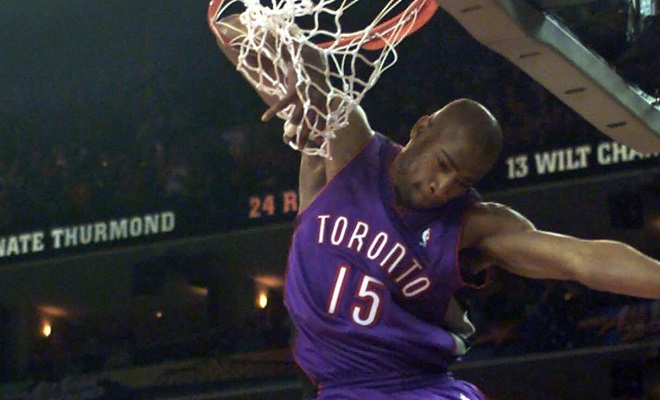-
 March 26, 2020, 11:41 am
March 26, 2020, 11:41 amLast Updated on March 26, 2020 11:59 am by Mike Passador | Published: March 26, 2020
In 1998, Vince Carter’s career debut was delayed because of a lockout-shortened season. Now, 22 years later, his career could end abruptly as we are on the brink of another abbreviated season with the COVID-19 pandemic bringing the entire sports world to a screeching halt.
Shortly after the NBA had announced the season would be suspended indefinitely, Carter was in the middle of what could be his final appearance as a professional and drilled a 3-pointer in the final seconds of an overtime loss. Postgame, with the future of the league in limbo, Carter described how he will look back on that night stating, “Golly, this is weird, man.” A weird ending to a brilliant career, indeed.
The future Hall-of-Famer did not get the farewell tour we have become accustomed to seeing with other high-profile veterans leaving the game recently, but his career accolades, fantasy prowess, and lasting effect on the Canadian basketball scene deserves praise.
The 5th overall pick in the ’98 draft was thrown into an unenviable situation in Toronto. In their brief three-season history the franchise finished last in the division every year and had yet to finish better than 12th in the conference. They played home games a makeshift court constructed in the Skydome, the home of the Blue Jays, Toronto’s Major League Baseball team. At the time, there was no excitement surrounding the team and Toronto was far from the rabid fanbase that flocks to “Jurassic Park” we know of today.
Enter Vince.
Right out of the gate, Carter gave fans a glimpse of what to expect for the years to come by catching a lob from Charles Oakley on his way to 16 points in his NBA debut. The highlight reel plays continued throughout the season and “Vinsanity” was born. He ended up running away with the Rookie of the Year, cashing in on 113 of the 118 possible votes. His season line of 18.3 points, 5.7 rebounds, 3.0 assists, 1.1 steals and 1.5 blocks were numbers that only one rookie had ever posted prior, Alvan Adams in 1976.
The team increased their win total by 7, from 16 to 23, in 32 fewer games, giving them the highest win percentage in franchise history at .460. Although they narrowly missed the playoffs, Carter’s effect on both ends of the floor was evident.
The following season Carter ascended into stardom. He began to put up gaudy scoring numbers, finishing the year 4th in the league with 25.7 points per game, including his first career 50-point performance.
Before making All-NBA Third Team, he earned his first All-Star selection and put on a show during All-Star Weekend with what is widely regarded as one of the best Dunk Contest performances of all time. “Half-Man, Half-Amazing” had solidified himself as one of the best players in the league, and one of the most exciting dunkers in the history of the game, combining power and acrobatics when throwing it down.
On his shoulders the team rolled on to 45 wins and secured the first playoff berth in franchise history before eventually being swept in the first round. The high-flying continued in the summer for Carter when he led the USA National team in scoring, at 14.8 points per game, on their way to a gold medal in the 2000 Summer Olympics in Sydney. Carter put the finishing touches on a perfect 8-0 tournament with a dunk over 7’2” Frédéric Weis. He literally leaped over the French center and former NBA first-round pick, creating one of the most memorable moments in Team USA Basketball history.
Everything came together for Vince and the Raptors during the 2000-01 season. The team increased their win total once again, capturing 47 victories, while finishing top-10 in both total points per game and offensive rating behind a career high 27.6 points per game from Carter, who ended the season 5th on the scoring list. Proving he could do it all on the offensive end, he posted career highs in 3-pointers made and attempted, while hitting them at a career best 40.8%.
The squad got revenge by returning the favor to the Knicks who had knocked them out of playoffs in the first round just a season before. The second round was an incredible faceoff against the league MVP, Allen Iverson, in which A.I. and Carter dueled all the way until the final seconds of Game 7, where Carter missed a midrange jumper that would have sent the Raptors to the Eastern Conference Finals. Carter finished the series dropping 30.4 points, 6.0 rebounds, 5.5 assists, 2.0 steals and 2.0 blocks a game.
Carter’s Game 3 performance was the best the franchise had ever seen to that point, as he lit the Sixers up for 50 points, including nine made 3s, on the way to a 24-point victory. This was as close as Carter’s Raptors would ever get to the pinnacle as they were bounced from the playoffs in the first round the following year and finished below .500 in his two final seasons with the club.
After the 2001 playoffs Carter’s production slipped slightly although he was named an All-Star each of the following three seasons. Injuries and friction with the front office ended with a midseason trade to New Jersey, as the relationship between Carter and Toronto had soured.
After leaving Toronto with the stigma that he gave up on the team and did not play through injuries he only missed 11 games in his 4 full seasons with the Nets. Paired with Jason Kidd, he averaged 23.6 points per game and lead the team to three straight playoff appearances.
Shortly after being defeated in the 2009 Finals, Orlando needed perimeter offense and traded for Carter and Ryan Anderson. At 33 Carter lacked the explosiveness he once used to dominate defenders but was still a viable outside player as he was a key cog in Orlando’s 2010 Eastern Conference Finals run.
The following year he was dealt again and headed to Phoenix in a six-player trade. He started 41 games for the Suns and scored 13.5 points per game but at this point was a shell of himself athletically and was shooting nearly 40% of his shots from deep.
After being waived by Phoenix he signed with Dallas and eventually settled into a bench rotation role, averaging 12 points in 25 minutes a game with the Mavs. At this point in his career, a 38-year-old Carter could have called it a day, and no one would have been surprised.
Instead he secured a multi-year deal with Memphis and averaged 6 shots off the bench each night. After a year in Sacramento, he finished out his final two years in Atlanta, coming off the end of the bench each night.
For the last five years of his career Carter has just been hanging around, and almost useless from a fantasy perspective, making it easy to forget his early career dominance and overall longevity in the fantasy world. As a neophyte he was top-40 in both 8- and 9-cat on a per-game basis, putting up equivalents to current day Robert Covington’s defensive numbers, paired with Tobias Harris’ offensive stats. He followed up that campaign with a dominant sophomore season, ranking 5th and 10th in 9-cat and 8-cat respectively. The 3-point makes, and percentages jump put him into top-tier fantasy player standing.
Year three was his fantasy peak, finishing the year 3rd in 8-cat, behind only Kobe Bryant and Ray Allen, and 2nd in 9-cat where he trailed only Allen. In the modern era we are spoiled with the all-around play of LeBron James and Giannis Antetokounmpo but in 2001 there were not any players in the league providing the production in every facet of the game like Carter was.
At the time Carter and Allen were the only two players in the league making over two 3-point shots a game, while shooting at least 40% from deep. While Allen had Carter beat in all three percentage categories, he did not have the overall scoring or defensive numbers Carter was posting.
In the subsequent years Carter came back to earth but still held third-round value in both 8- and 9-cat for the next eight seasons. A legendary fantasy run did not come to an end there. After being dealt to Orlando and finding his new role he held top-120 status four of the next five years.
To many, Vince put Toronto on the map in the basketball world. He gave everyone a taste of what was happening up North in the 2000 Dunk Contest and shortly thereafter followed it up with a 50-point performance in the franchise’s first ever nationally televised game. The All-Star seasons and playoff runs that followed brought an excitement for basketball the hockey-heavy city had not previously experienced.
Carter has stayed in the league long enough to witness the effect he had on Canadian basketball firsthand. Since 1946 there have been 49 Canadian-born players to play in the NBA, 22 of which are current players. R.J. Barrett, one of those Canadians, coincidently lined up next to Carter during a free throw in the final seconds of the veteran’s presumptive final NBA appearance. The influx of young Canadian players in the NBA can be directly connected to Carter as they are all within the age group to have grown up during the Vinsanity era.
Toronto especially has become a hotbed of basketball talent, producing players such as Tristan Thompson, Cory Joseph, Andrew Wiggins and Kelly Olynyk, all of whom have credited Carter with forwarding their love of the game. Not to mention the next wave of players including Barrett, Jamal Murray and Shai Gilgeous-Alexander, among others.
Although the eight-time All-Star never made an NBA Finals or finished better than 11th in MVP voting, he provided us with a career that touched four decades full of dominant performances and highlight-reel plays that will last forever.
